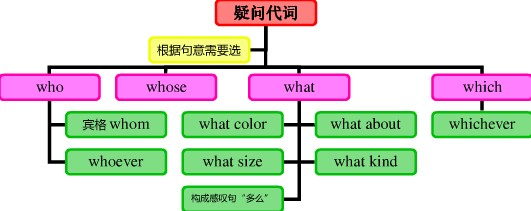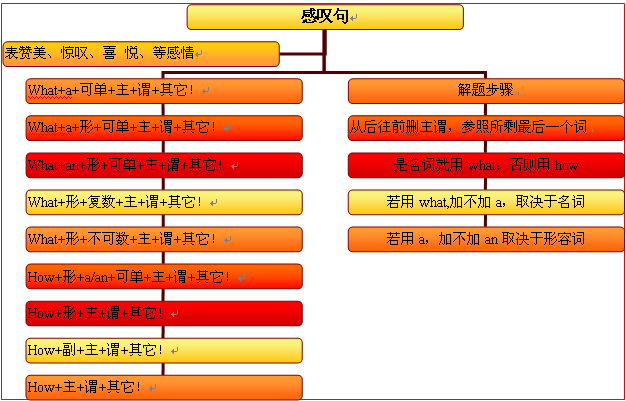本试题 “__________ beautiful scenery it is when in spring![ ]A. How aB. HowC. What aD. What” 主要考查您对疑问代词
感叹句
等考点的理解。关于这些考点您可以点击下面的选项卡查看详细档案。
- 疑问代词
- 感叹句
疑问代词的概念:
疑问代词用来引导特殊疑问句,放在句首,句子一般读降调。疑问代词还可以引导从句,疑问代词全部属于第三人称,一般为单数,有时也代表复数。
疑问代词有who,whom,whose,what 和 which。
疑问代词的用法:
疑问代词(who, whom, whose, which, what 等)在句中可用作主语、表语、宾语、定语等。
如:Who is your English teacher? 你们的英语老师是谁?
Whose is this umbrella? 这伞是谁的?
Whose umbrella is this? 这是谁的伞?
What question did heask? 他问了什么问题?
Which do you prefer, tea or coffee? 茶和咖啡,你喜欢那样?
注:who和whom只用作主语、宾语和表语,不用作定语,what, which, whose则既可用作主语、宾语和表语,也可用作定语。
两组疑问代词的用法比较:
1、who与whom:
前者为主格,用作主语,后者为宾格,用作宾格。
如:Who spoke at the meeting? 谁在会上发言了?
Whomareyoutalkingabout? 你们在谈论谁?但是,当用作宾语的whom位于句首时,通常可用who代之。
Who(m) is the letter from? 这信是谁寄来的?若是紧跟在介词之后用作宾语,则只能用whom。
2、what,which与who:
①若后接名词(即用作限定词),只用which和what,不能用who。
如:Which/What train did you come on? 你是坐哪次火车来的?
What和which的区别是:
当选择的范围较小或比较明确时,多用which;当选择的范围较较大或不明确时,多用what:
Which color do you like, red, black or white? 红色、黑色和白色,你喜欢哪种?
What color is your car?你的汽车是什么颜色的?
但是,若指人,即使选择的范围不明确,也多which:
Which [What] writers do you like? 你喜欢哪些作家?
②若其后不接名词(即用作代词),三者均可用,which和what的用法区别可参见上面的分析。
至于who,它一般只用来指人(用作代词的which不用于指人),不管选择范围大还是小、明确还是不明确均可用。 如:
Who won? Tom or Mike? 谁赢了,是汤姆还是迈克?
Who is your favorite poet? 你最喜欢的诗人是谁?
当选择范围比较明确且用作宾语时,who也可用which或whichone代之。如:
Who[Which/Whichone]do you like better, your father or your mother? 你更喜欢谁,父亲还是母亲?
③由于what和who的选择范围可以很大或不明确,所以其后可以跟else,表示其他的人(或事物),但却通常不跟表示特定范围的of短语;
而which的选择范围相对比较小或明确,所以其后一般不接else,却常与表特定范围的of短语连用:
Who(What)elsedidyouseethere?你在那儿还看到了别人的什么人(什么东西)?
Which of the three girls is the oldest? 这三个女孩中哪个年纪最大?
④另外,比较以下两句:
"Who is he?" 他是谁?(who指姓名、关系等)
What is he? 他是干什么的?(what指职业、地位等)
两个疑问词同用的情况:
1、Where and when were you born? 你出生在何时何地?
2、When and how did he go there? 他是什么时候、怎么去那儿的?
3、"Where is it?" "Where is what?"“它在哪儿?”“什么在哪儿?”
疑问代词知识体系:

两类易混句型的区别:
What do you think he wants? 你认为他想要什么?
Do you know what he wants? 你知道他想要什么吗?
上面第一句为特殊疑问句,第二句为一般疑问句,它们不能倒过来说成 Do you think what he wants? What do you know he wants?其原则区别是:
可以用yes或no回答者,用一般疑问句的形式(疑问词放在句中,即主句之后),适合这类句型的主句动词通常有know, hear, ask, tell 等;
不能用yes或no回答者,用特殊疑问句的形式(疑问词放在句首),适合这类句型的主句动词通常有think, believe, suppose, guess 等。
如:Where do you suppose he has gone? 你认为他去什么地方了?
Did you ask why he had left so soon? 你问过他为什么那么快就离开了吗?
感叹句的概念:
感叹句是表示喜怒哀乐等情感的句子。感叹句一般用how或what开头。How作状语,修饰修饰形容词、副词、或句子。what作定语,修饰名词(名词前可有形容词或冠词)。感叹句要用降调,句末用感叹号。
感叹句的几种常用形式:
一、How+形容词〔或副词〕+S+V…!
如:How boring this is! 这实在太无趣了!
How beautifully you sing! 你唱得真美妙!
How well she remembered the first time she had seen him! 她把初见他的那幕情景记得好清楚呀!
注:有时会将形容词或副词省略。
如:How you've changed! 你的变化真大!
二、What a[an]+形容词+名词+S+V…!
如:What a bad cough he has! 他咳得好历害!
What a voyage they had! 他们这段航行经验真是太完美〔可怕〕了!
注:这类句子若无形容词,则须就上下文来判断形容词为何。
如:What a man he is! 那家伙算什么!
What a business it is moving house! 搬家这件事真够受的!
另外,若名词为不可数或复数的话,就不能用不定冠词。
如:What bad weather we're having! 多讨厌的天气!
What fun it will be when we all go on holiday together. 我们大家一起去度假那可太有意思了。
What lovely flowers they are! 好美的花朵啊!
三、How+形容词+a[an]+名词+S+V…!
如:How kind a man he is! 他这个人真好!
注:感叹句的省略用法 How lucky (I am)! 我是多么地幸运啊!
如:What a strange man(he is)! 好奇怪的人啊!
What a pity (it is) that you can't come with us! 你不能和我们一起来,真是可惜啊!
How careless(it is) of him to make such a mistake! 他是不小心,才会犯下这种错误!
感叹句知识体系:

特殊的感叹句表达形式:
1、以副词here, there, in开头的感叹句。
如:Here comes the bus! 公共汽车来了!
There they are! 他们在那儿呢!
2、以疑问词who开头,表示惊奇。
如:Who else will read such a book! 谁还会读这样的书!
3、以情态动词may开头,表示愿望。
如:May you both be happy! 祝二位幸福。
May you succeed! 祝你成功!
4、否定疑问句用作感叹句时,它的意义是肯定的;但肯定疑问句用作感叹句在美国英语中比较常见。
如:Aren't they sweet! 他们多可爱啊!
Am I hungry! 我饿极了!
5、一些短语用作感叹句。
如:Dear me! 哎呀!
My goodness! 嗳呀!
None of your nonsense! 不要胡说了!
6、一些作表语的成分用作感叹句。
如:Just my luck! 又倒霉了!
Sorry, my mistake! 对不起,是我的错!
7、以从句表示的感叹句。
如:As if were my fault! 好像是我的错似的!
To think as candal of this sort should be going on under my roof! 真想不到这种丑事竟然出在我们家里!
与“__________ beautiful scenery it is when in spring![ ]A. H...”考查相似的试题有:
- In this workshop, the output of July was three times of January.A.thatB.thisC.oneD.it
- — May I help you?— Yes, I'd like to try on some sports jackets just like I'm wearing. A.itB.oneC.the oneD.that
- She finds ______ boring ______ at home.A.it; stayingB.that; being stayedC.this; to stayD.it; stayed
- They will see ______off.A.I,you and TomB.you,Tom andC.Tom ,you and meD.you,Tom and me
- Daniel, we ______ you were an adult, ______ who would make good decisions…A.think; oneB.thought; oneC.think; thatD...
- _____ child can finish his homework on time.A.No everyB.Not everyC.No eachD.Not each
- My bike is missing. I can’t find ____ anywhere.A.oneB.onesC.itD.that
- ---I don’t believe . He’s blaming the failed program on me.---What options does he have? He can’t say it is his fault...
- Helping others is a habit, _______ you can learn even at an early age.A.itB.thatC.whatD.one
- Some friends tried to settle the quarrel between Mr. and Mrs. Brown without hurting the feeling of , but failed .A.n...